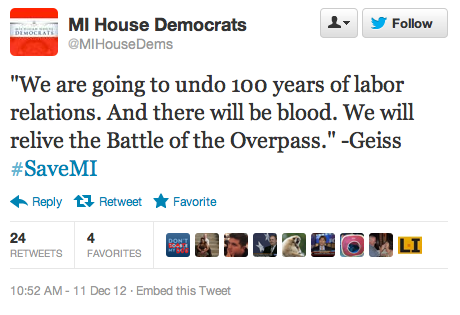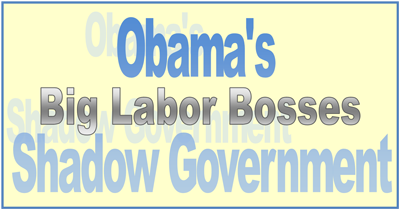Michigan's "Stunning" Move Toward Freedom
National political columnist Rich Lowry calls the developments in Michigan "stunning" while explaining how Indiana, since their enactment of a Right to Work law, has created 43,300 jobs while Michigan was losing jobs. It was the advent of an era of industrial unionization that may be coming to a symbolic end in the same place it started. Michigan is on the verge of passing the kind of “right to work” law that is anathema to unions everywhere and is associated with the red states of the Sun Belt, not the blue states of the Rust Belt. To say that such a development is stunning is almost an understatement. Michigan is to unionization what Florida is to sand, Texas is to oil, and Alaska is to grizzly bears. The union model hasn’t just been central to its economy, but to its very identity. Michigan was undergoing a real-world experiment in the merits of forced unionization versus right-to-work after neighboring Indiana adopted a right-to-work law earlier this year, the first Rust Belt state to do so. The early returns weren’t encouraging. Indiana added 43,300 jobs — 13,900 of them in manufacturing — while Michigan shed 7,300 jobs. Michigan governor Rick Snyder, a Republican reformer but not a bomb thrower, says seeing 90 companies from around the country decide to settle in Indiana after the labor change influenced his willingness to sign a bill doing the same thing.
Michigan's "Stunning" Move Toward Freedom
National political columnist Rich Lowry calls the developments in Michigan "stunning" while explaining how Indiana, since their enactment of a Right to Work law, has created 43,300 jobs while Michigan was losing jobs. It was the advent of an era of industrial unionization that may be coming to a symbolic end in the same place it started. Michigan is on the verge of passing the kind of “right to work” law that is anathema to unions everywhere and is associated with the red states of the Sun Belt, not the blue states of the Rust Belt. To say that such a development is stunning is almost an understatement. Michigan is to unionization what Florida is to sand, Texas is to oil, and Alaska is to grizzly bears. The union model hasn’t just been central to its economy, but to its very identity. Michigan was undergoing a real-world experiment in the merits of forced unionization versus right-to-work after neighboring Indiana adopted a right-to-work law earlier this year, the first Rust Belt state to do so. The early returns weren’t encouraging. Indiana added 43,300 jobs — 13,900 of them in manufacturing — while Michigan shed 7,300 jobs. Michigan governor Rick Snyder, a Republican reformer but not a bomb thrower, says seeing 90 companies from around the country decide to settle in Indiana after the labor change influenced his willingness to sign a bill doing the same thing.

Michigan Democrats Warn "there will be blood."

Michigan Democrats Warn "there will be blood."
Fighting for the freedom ... Dem threatens
From Michelle Malkin: “To compel a man to furnish funds for the propagation of ideas he disbelieves and abhors is sinful and tyrannical.” – Thomas Jefferson…

Big Labor Sues to Force Kids into Bad Schools
Just when you think they can't go any lower, the union bosses have filed a lawsuit in Louisiana to force children to attend poor schools. The Wall Street Journal opines on the latest big labor outrage: Here's the bizarre world in which we live: In 2007 Gabriel Evans attended a public school in New Orleans graded "F" by the Louisiana Department of Education. Thanks to a New Orleans voucher program, Gabriel moved in 2008 to a Catholic school. His mother, Valerie Evans, calls the voucher a "lifesaver," allowing him to get "out of a public school system that is filled with fear, confusion and violence." So what is the response of the teachers union? Sue the state to force 11-year-old Gabriel back to the failing school. This week a state court in Baton Rouge is hearing the union challenge to Louisiana's Act 2, which expanded the New Orleans program statewide and allows families with a household income less than 250% of the federal poverty line to get a voucher to escape schools ranked C or worse by the state. Gabriel's voucher covers $4,315 in annual tuition. The tragedy is how many students qualify for the program. According to the state, 953 of the state's 1,373 public schools (K-12) were ranked C, D or F. Under the new program, more than 4,900 students have received scholarships allowing them to attend non-public schools. Enter the teachers unions, which sued this summer to stop the incursion into their rotting enterprise. According to the Louisiana Federation of Teachers and the Louisiana Association of Educators, the voucher program steals money from public schools.

Big Labor Bosses Are Back at the White House
An obvious residual effect of President Obama’s re-election was the renewal of his government giveaways to the union bosses.

Big Labor's Burden On Taxpayers Straining Relationships With Big City Mayors
Reason opines that the fiscal reality of many cities have ended the love affair, in some instances, between local Democrat mayors and the union who elected them. But, it will likely not bring reform aslong as political machines a mostly funded and controlled by labor union bosses: When Chicago public school teachers started the fall semester by turning down a $400 million contract offer that would have boosted pay by 16 percent over four years, my first concern wasn’t for the children. It was for the Democrats. Sure, the walkout by Chicago Teachers Union members caused havoc for kids. But I’ve been to public school, and I can tell you they didn’t miss much. The strike’s lasting damage was to the party that since at least the early 20th century has been labor’s best friend. Chicago Mayor Rahm Emanuel is not just some schmuck in the donkey party: He is President Barack Obama’s former chief of staff, the congressional leader behind the Democrats’ 2006 House takeover, a Clinton administration arm twister so feared that he is still known by his ’90s nickname, Rahmbo. But the strike made Chicago’s tough-guy mayor look like Chuck “Bayonne Bleeder” Wepner. Striking teachers dubbed him “Empermanuel,” accused him of having “no respect for us as people,” and even claimed (falsely, it turned out) that Emanuel was a fan of the Canadian alt-rock quartet Nickelback. When the teachers returned to work after more than a week on the picket line, they had scored a big pay increase and crippled the teacher-evaluation testing at the heart of the strike, a resolution Emanuel unconvincingly called an “honest compromise.” Emanuel is one of many recent Democratic chief executives who have, with varying levels of enthusiasm and success, tried to confront government employee unions. California Gov. Jerry Brown struggled for two years to get a minor pension bill through the legislature. New York Gov. Andrew Cuomo in March got a partial pension reform that is expected to save $3 billion a year out of the Empire State’s $133 billion annual budget. Washington, D.C., Mayor Adrian Fenty lost his job when he took on the teachers union.